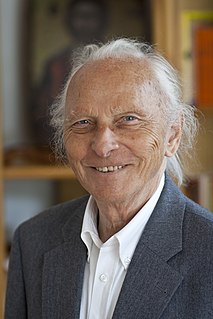A Quote by Alexander McCall Smith
I see no point in being despondent. We might as well enjoy ourselves during our brief tenure of this life.
Related Quotes
You know who has tenure? The pope has tenure. The Queen of England has tenure. So does Fidel and the communists - because they represent the people, of course (scoff). Federal judges have tenure as well - no federal judge has ever successfully been removed. And then there's the college professors. Me. How do you like that?
The biggest adversary in our life is ourselves. We are what we are, in a sense, because of the dominating thoughts we allow to gather in our head. All concepts of self-improvement, all actions and paths we take, relate solely to our abstract image of ourselves. Life is limited only by how we really see ourselves and feel about our being. A great deal of pure self-knowledge and inner understanding allows us to lay an all-important foundation for the structure of our life from which we can perceive and take the right avenues.
Without a doubt, one of the things which keeps us from attaining perfection is our tongue. When one has reached the point of no longer committing faults in speech, he has surely reached perfection, as was said by the Holy Spirit. The worst defect in talking is talking too much. Hence, in speech be brief and virtuous, brief and gentle, brief and simple, brief and charitable, brief and amiable.
We leave something of ourselves behind when we leave a place. We stay there even though we go away and there are things in us we can find again only by going back there. We travel to ourselves when we go to a place. We have covered a stretch of our life no matter how brief it may have been but by traveling to ourselves we must confront our own loneliness. And isn’t it so that everything we do is done out of fear of our loneliness? Isn’t that why we renounce all the things we will regret at the end of our life?
To have humility is to experience reality, not in relation to ourselves, but in its sacred independence. It is to see, judge, and act from the point of rest in ourselves. Then, how much disappears, and all that remains falls into place. In the point of rest at the center of our being, we encounter a world where all things are at rest in the same way. Then a tree becomes a mystery, a cloud a revelation, each man a cosmos of whose riches we can only catch glimpses. The life of simplicity is simple, but it opens to us a book in which we never get beyond the first syllable.
There is great freedom in simplicity of living, and after I began to feel this, I found harmony in my life between inner and outer well-being. There is a great deal to be said about such harmony, not only for an individual life but also for the life of a society. It's because as a world we have gotten ourselves so far out of harmony, so way off on the material side, that when we discover something like nuclear energy we are still capable of putting it into a bomb and using it to kill people! This is because our inner well-being lags so far behind our outer well-being.
His true Being comes to light and even penetrates his clothing. We should not limit ourselves to Jesus. We have to recognize ourselves, our own true form... Life would be so simple if we could always see what we are; if we could recognize what our neighbors are. If we could see the beams of light that pass through their clothing; if we could not only see their external form, but also experience their true being.





































